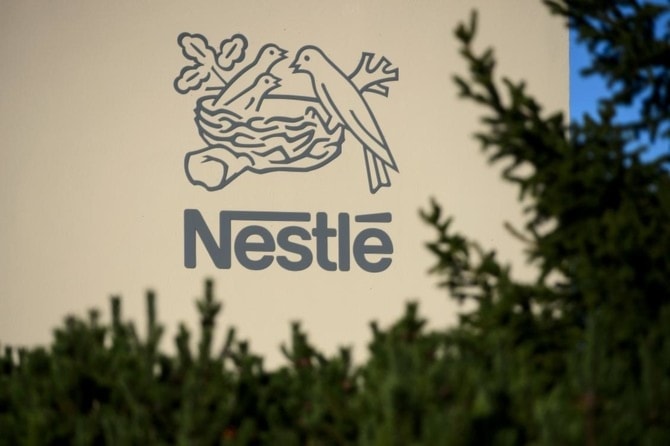Nestlé adds sugar to baby formula, cereal sold in Africa, L. America
A report by Public Eye has exposed Nestlé for adding sugar to baby foods sold in poorer countries, against international health recommendations and in a discriminatory double standard.
-

This file photo shows a logo of the world's leading food industry group Nestle at the group's Research Center in Vers-chez-les-Blanc above Lausanne. (AFP)
Nestlé has been adding sugar and honey to its infant milk and cereal products sold in poorer countries, as opposed to international health guidelines aimed at preventing obesity and chronic diseases.
The Guardian, citing findings by a Swiss investigative organization called Public Eye, reported that baby food products sold in African and Latin American markets had a different formula than those sold in European markets.
It was found that Nido infant milk for ages one and above and Cerelac cereal for children aged six months to two years had added sugar and honey, which goes against international recommendations that state children below the age of two to four should not have sugar intakes in their nutritional diets.
This also comes amid research that proved that obesity has become an increasingly common health problem in middle to low-income countries, with the World Health Organization finding that the number of overweight children under five has increased by nearly 23% since 2000 in Africa.
In this context, it is worth noting that 40% of sales of Cerelac are in the Brazilian and Indian markets, forming the largest figures of sales within low-to-middle-income countries. In Brazil, six of eight Nestle products contained 4 grams of added sugar per serving, while Nigeria's contained 6.8 grams.
The report showed that biscuit-flavored cereal for babies aged six months had 6 grams of added sugar in products allocated for Senegal and South Africa, but zero grams in Europe.
Regarding Nido, the product contained roughly 2g of added sugar per 100g of product, primarily in the form of honey, or 0.8g per serving in Indonesia.
In Mexico, two out of the three Nido products intended for toddlers had no extra sugar, but the third product contained 1.7g per serving. The report also noted that Nido Kinder 1+ products sold in South Africa, Nigeria, and Senegal each contained nearly 1g per serving.
What is additionally concerning is the fact that the packaging does not directly indicate the nutrients and substances within the product's formula, alongside the fact that labels themselves cannot be universally read and understood the same way.
Labels also usually include added sugars under the same heading as natural or organic sugars found in fruits.
'An unjustifiable double standard'
When Nestlé was faced with the findings of its products' examinations, the consumer goods giant insisted that its products' formulas comply with international health regulations.
“We believe in the nutritional quality of our products for early childhood and prioritize using high-quality ingredients adapted to the growth and development of children,” a Nestlé spokesperson said.
However, to justify the level of added sugars in its infant goods, Nestlé claimed that the formula depends on the availabilities of the local market and what local goods contain from added sugars to unhealthy and unrecommended ingredients.
“Nestlé must put an end to these dangerous double standards and stop adding sugar in all products for children under three years old, in every part of the world,” Laurent Gaberell, Public Eye’s agriculture and nutrition expert said.
Dr. Nigel Rollins, a medical officer at the WHO, slammed Nestlé, saying that the findings represented “a double standard that can’t be justified."
Nestlé at the forefront of boycotts
Nestlé does not only include unhealthy ingredients within its products under a discriminatory notion but is also linked to the Israeli genocide in Gaza.
The BDS movement has been calling for the boycott of Nestlé products for the company's support of "Israel", which enables the slaughter of Palestinians in Gaza.
As more and more countries denounced "Israel's" military onslaught in Gaza, Nestlé products were at the forefront of the boycott.
In November, Nestlé products were withdrawn from parliamentary restaurants due to their justified support for "Israel".
"It was decided that the products of companies that support Israel will not be sold in restaurants, cafeterias, and tea houses in the parliament campus," said a parliamentary statement, without naming the companies.
A source within the parliament informed Reuters that only Coca-Cola beverages and Nestlé instant coffee have so far been removed from the menu. The decision, the source stated, was made in response to public demand.
Turkey decides to launch major action against Israel, removes products of brands that support Israel from the menu of Parliament.
— Megh Updates 🚨™ (@MeghUpdates) November 7, 2023
Nescafe and Coca Cola removed from the menu. pic.twitter.com/i7bpHLkqR8

 4 Min Read
4 Min Read










